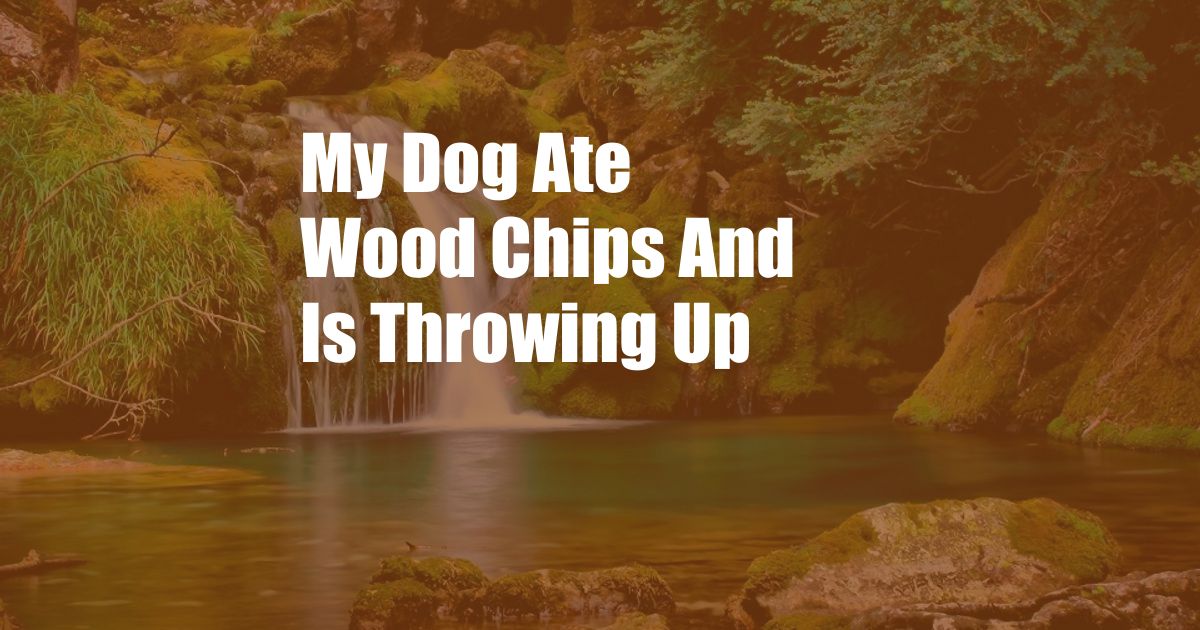
Oh No! My Dog Ate Wood Chips and Is Throwing Up – What should I do?
As a dog owner, one of the scariest things that can happen is when your furry friend ingests something they shouldn’t. Wood chips, a common landscaping material, can be particularly concerning due to their potential toxicity. In this article, we will delve into the dangers of wood chip ingestion in dogs, its symptoms, and the steps you should take if your dog has eaten wood chips.
If you suspect your dog has eaten wood chips, it’s crucial to seek veterinary attention immediately. Wood chips can splinter and cause internal injuries, and certain types of wood may contain toxic substances. The severity of the situation will depend on the type of wood, the amount ingested, and your dog’s individual reaction.
Toxicity of Wood Chips
Not all wood chips are created equal. While some woods are relatively harmless, others can be highly toxic to dogs. The most dangerous wood chips are those made from black walnut, cherry, and oak trees. These woods contain a toxin called juglone, which can cause severe gastrointestinal upset, liver damage, and even death in dogs.
Even wood chips that are not inherently toxic can still pose a risk to your dog. If ingested in large quantities, wood chips can cause blockages in the digestive tract. This can lead to vomiting, diarrhea, constipation, and abdominal pain. In severe cases, a blockage can require surgery to remove.
Symptoms of Wood Chip Ingestion
The symptoms of wood chip ingestion in dogs can vary depending on the type of wood ingested, the amount consumed, and your dog’s sensitivity. Common symptoms include:
- Vomiting
- Diarrhea
- Constipation
- Abdominal pain
- Lethargy
- Loss of appetite
- Drooling
- Pawing at the mouth
If your dog is experiencing any of these symptoms after eating wood chips, seek veterinary attention immediately.
What to Do if Your Dog Eats Wood Chips
If you witness your dog eating wood chips, or if you suspect they may have done so, follow these steps:
- Remove any remaining wood chips from your dog’s reach.
- Call your veterinarian or the nearest veterinary emergency clinic immediately.
- Do not induce vomiting unless directed to do so by a veterinarian.
- Bring a sample of the wood chips to the veterinarian’s office.
- Follow your veterinarian’s instructions carefully.
Tips for Preventing Wood Chip Ingestion
The best way to prevent wood chip ingestion in dogs is to keep them away from wood chips altogether. Here are some tips:
- Keep wood chips out of your dog’s reach by storing them in a tightly sealed container.
- Supervise your dog when they are outside in areas where there may be wood chips.
- Train your dog not to eat wood chips. You can do this using positive reinforcement techniques.
- Provide your dog with plenty of safe chew toys to keep them from chewing on wood chips.
By following these tips, you can help prevent your dog from ingesting wood chips and the potential dangers that come with it.
FAQs about Wood Chip Ingestion in Dogs
Q: Can all dogs get sick from eating wood chips?
A: No, not all dogs will get sick from eating wood chips. However, some dogs are more sensitive to wood chips than others. Puppies, older dogs, and dogs with compromised immune systems are at a higher risk of developing health problems after eating wood chips.
Q: What should I do if my dog eats a small amount of wood chips?
A: If your dog eats a small amount of wood chips and is not showing any symptoms, you may not need to seek veterinary attention. However, it is important to monitor your dog closely for any signs of illness. If your dog starts vomiting, has diarrhea, or shows any other symptoms, seek veterinary attention immediately.
Q: How do I know if my dog has eaten toxic wood chips?
A: The symptoms of toxic wood chip ingestion can vary depending on the type of wood ingested. However, some common symptoms include vomiting, diarrhea, abdominal pain, lethargy, and loss of appetite. If you suspect your dog has eaten toxic wood chips, seek veterinary attention immediately.
Q: How is wood chip ingestion treated?
A: The treatment for wood chip ingestion will depend on the type of wood ingested, the amount consumed, and your dog’s individual reaction. In some cases, no treatment may be necessary. However, in other cases, your dog may need to be hospitalized for supportive care. Treatment may include IV fluids, antibiotics, and surgery to remove a blockage.
Conclusion
Wood chip ingestion in dogs can be a serious problem, but it is one that can be prevented. By following the tips outlined in this article, you can help keep your dog safe from the dangers of wood chips.
If you have any questions about wood chip ingestion in dogs, please do not hesitate to contact your veterinarian.
Are you interested in learning more about dog safety? Check out our other articles on dog safety topics.